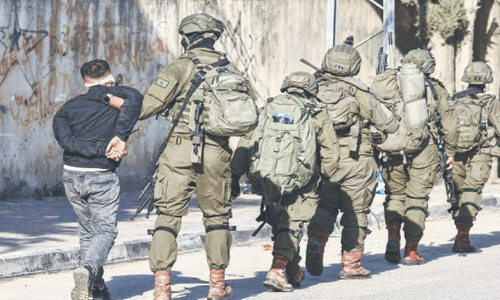KABUL: When Afghans select their new president next month, it will largely be up to tens of thousands of Afghan poll watchers to catch signs of ballot box stuffing and other vote-rigging that tarnished Hamid Karzai’s re-election five years ago. The international observer mission is far smaller this time, and relentless violence has driven away many foreigners who signed up.
It is an example of how Afghan civilian institutions and the military are adjusting to a shrinking international footprint. The US and allied combat troops are preparing to withdraw by the end of this year despite a resilient Taliban insurgency, and Syria and other conflicts are increasingly competing with Afghanistan for aid money and attention.
Afghans will be choosing a successor to Karzai in the April 5 election, since he is constitutionally barred from a third term.
With three strong contenders out of nine candidates overall, nobody is expected to get the majority needed to avoid a runoff. If one candidate does win in the first round, others are more likely to cry foul.
Authorities are under tremendous pressure to prevent a repeat of the rampant fraud that discredited the last national elections in 2009, tarnishing Karzai’s second term as president and undermining public confidence in his government.
Allegations of large-scale ballot stuffing, phantom polling stations and turnouts in some areas above 100 per cent prompted UN auditors to throw out nearly a third of Karzai’s votes, pushing him below the 50 per cent mark needed to avoid a second round.
All that happened with more than 1,200 international and 10,000 Afghan observers fanned out across the nation. This year, the number of foreigners signed up as observers for the presidential and provincial council elections has dropped sharply to about 200. The number of Afghans, on the other hand, has soared to more than 100,000.
“One of the impacts of tougher security is that it increases the price of doing business,” said Nicholas Haysom, the deputy UN chief in Afghanistan.
“One of the real opportunities Afghanistan has to project a positive image of itself is credible elections.”
The bloodshed already has prompted two major international organizations to pull out their teams. The US-based National Democratic Institute (NDI) and the Organisation for Security and Cooperation (OSCE) in Europe evacuated their observers after last week’s attack on the Serena hotel in Kabul that killed a Paraguayan observer and eight other people, including two children.
“The 15 members of the election support team we sent to Kabul were all in the Serena the night of the attack. No one from our team was harmed but, as I’m sure you can understand, this was a very traumatic experience,” said Thomas Rymer, a spokesman for the OSCE''s Office for Democratic Institutions and Human Rights.
“We are also assessing the condition of the team members, and will couple this with the security assessment in making a decision on whether the team will return for the 5 April elections. The option to return is still under consideration.”
Thijs Berman, the head of the European Union’s election assessment team in Kabul, said security restrictions made the observers largely ineffective in 2009 so the mission has shifted to focus on analysis.
“It was a huge investment and low output so we decided it was better to not to deploy them this time,” he said.
Berman said six of 16 observers left the country to wait for more armoured vehicles and guards to protect their movements even within the Afghan capital, but that they would be back for the election.
“We decided to let them wait outside of the country instead of having them sit idle,” he said.
Afghan and international election officials said the psychological impact was huge.
Jandad Spinghar, director of one of the largest local monitoring organizations, the Free and Fair Election Forum of Afghanistan, is worried that others will follow as the Taliban step up attacks ahead of Election Day.
“Having international observers in the electoral process is very important in terms of getting international legitimacy for the election,” he said.
Authorities have put in place new measures to counter fraud, such as bar codes to track bags of ballots delivered to the nearly 7,000 polling centres and two different kinds of indelible ink to prevent voters from casting more than one ballot.
But the candidates and others aren’t taking any chances. The three front-runners – Abdullah Abdullah, who was the runner-up in the disputed 2009 election, Ashraf Ghani Ahmadzai and Zalmai Rassoul – as well as dozens of political parties are sending thousands of campaign agents to monitor the vote. In addition, several Afghan nongovernmental organisations are mobilising observers.
Abdullah said his campaign and affiliated parties are fielding more than 15,000 agents.
“I will not say that the domestic observers can be an alternative for the world class experts, but at the same time we have to see how we can make the best of it,” he told The Associated Press in a telephone interview Tuesday. He said the international observers would at this point most likely be helpful in monitoring the two Afghan commissions overseeing the vote amid concerns of government interference.
The threat of violence isn’t limited to foreigners. The Taliban have warned voters to stay away from the polls, saying they will use all force necessary to disrupt the balloting.
On Tuesday, a suicide car bomber and gunmen attacked an Independent Election Commission office on the outskirts of Kabul, killing four people, including a provincial council candidate, an election worker, a civilian and a policeman.
The latest attack “shows that Taliban will use any opportunity against observers, against anyone working in the process,” Spinghar said. He said long-term Afghan observers have resigned from his organisation in three provinces because they fear they will be the next victims.

































